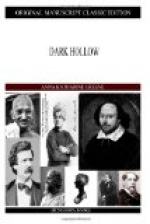What saved me? A new discovery, and the loving sympathy of my son Oliver. One night—a momentous one to me—he came to my room and, closing the door behind him, stood with his back to it, contemplating me in a way that startled me.
What had happened? What lay behind this new and penetrating look, this anxious and yet persistent manner? I dared not think. I dared not yield to the terror which must follow thought. Terror blanches the cheek and my cheek must never blanch under anybody’s scrutiny. Never, never, so long as I lived.
“Father,”—the tone quieted me, for I knew from its gentleness that he was hesitating to speak more on his own account than on mine—“you are not looking well; this thing worries you. I hate to see you like this. Is it just the loss of your old friend, or—or--”
He faltered, not knowing how to proceed. There was nothing strange in this. There could not have been much encouragement in my expression. I was holding on to myself with much too convulsive a grasp.
“Sometimes I think,” he recommenced, “that you don’t feel quite sure of this man Scoville’s guilt. Is that so? Tell me, father.”
I did not know what to make of him. There was no shrinking from me; no conscious or unconscious accusation in voice or look, but there was a desire to know, and a certain latent resolve behind it all that marked the line between obedient boyhood and thinking, determining man. With all my dread—a dread so great I felt the first grasp of age upon my heart-strings at that moment—I recognised no other course than to meet this inquiry of his with the truth—that is, with just so much of the truth as was needed. No more, not one jot more. I, therefore, answered, and with a show of self-possession at which I now wonder:
“You are not far from right, Oliver. I have had moments of doubt. The evidence, as you must have noticed, is purely circumstantial.”
“But a jury has convicted him.”
“Yes.”
“On the evidence you mention?”
“Yes.”
“What evidence would satisfy you? What would you consider a conclusive proof of guilt?”
I told him in the set phrases of my profession.
“Then,” he declared as I finished, “you may rest easy as to this man’s right to receive a sentence of death.”
I could not trust my ears.
“I know from personal observation,” he proceeded, approaching me with a firm step, “that he is not only capable of the crime for which he has been convicted, but that he has actually committed one under similar circumstances, and possibly for the same end.”
And he told me the story of that night of storm and bloodshed,—a story which will be found lying near this, in my alcove of shame and contrition.
It had an overwhelming effect upon me. I had been very near death. Suicide must have ended the struggle in which I was engaged, had not this knowledge of actual and unpunished crime come to ease my conscience. John Scoville was worthy of death, and, being so, should receive the full reward of his deed. I need hesitate no longer.




